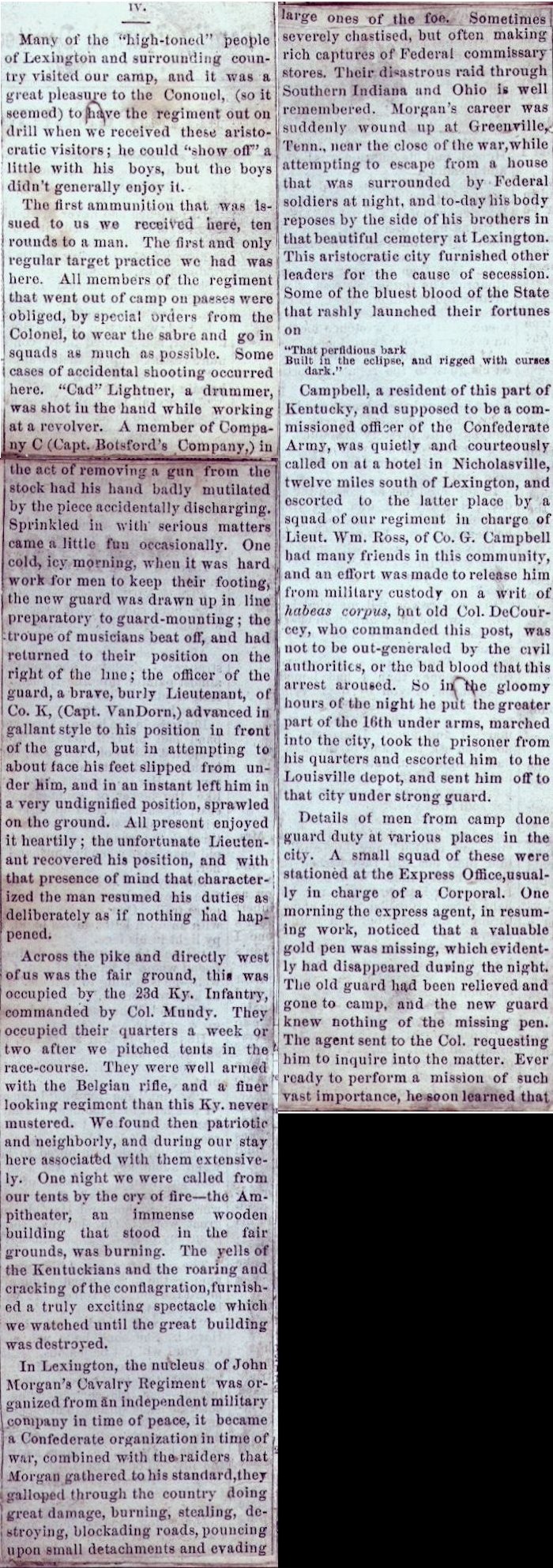| Camp & Field Page 4 | Camp & Field Index Page | 16th OVI Home Page | Camp & Field Page 6 |
The Camp & FieldArticles by Theodore Wolbach |
 Cpl. Theodore D. Wolbach |
The following image is taken from a book titled "Mortality and Statistics of the Census of 1850" in which it is believed retired Captain Rezin H. Vorhes, Company H, pasted over the pages a series of articles written by Cpl. Theodore D. Wolbach, Company E, titled "Camp and Field" and published, by chapter, in the Holmes County (Ohio) Republican newspaper from February 24, 1881 to August 17, 1882. The articles tell the story, in great detail and color, of the 16th OVI, from the inception of the 3-year regiment in October, 1861, through all its camps, battles and marches until it was disbanded on October 31, 1864. The articles pasted in the Vorhes book cover the first 35 chapters, published through October 20, 1881. All the remaining chapters were recently found in a Holmes County library by researcher Rob Garber who obtained copies, performed the transcriptions and provided to this website and which are also presented here, thus providing the complete work by Theodore Wolbach.
Throughout these articles click on the underlined white text for additional details.
The webauthor thanks 16th Ohio descendant Rob Garber for his excellent research on the Camp And Field articles and for performing the tedious digital transcription of those articles found on each page. The transcriptions were made to reflect the original articles verbatim, misspellings and all. Rob is the 3rd great nephew of Capt. William Buchanan, Company F, 16th Ohio, who served in the 90-day regiment as a private, re-enlisting in the three year regiment, and eventually making the rank of Captain of Company F. Thanks Rob!
Page 5 - Chapter 4 - December, 1861
 |
Published in Holmes County Republican IV. Many of the The first ammunition that was issued to us we received here, ten rounds to a man. The first and only regular target practice we had was here. All members of the regiment that went out of camp on passes were obliged, by special orders from the Colonel, to wear the sabre and go in squads as much as possible. Some cases of accidental shooting occurred here. Across the pike and directly west of us was the fair ground, this was occupied by the 23d Ky. Infantry, commanded by Col. Mundy. They occupied their quarters a week or two after we pitched tents in the race-course. They were well armed with the Belgian rifle, and a finer looking regiment than this Ky. never mustered. We found then [sic] patriotic and neighborly, and during our stay here associated with them extensively. One night we were called from our tents by the cry of fire--the Ampitheater [sic], an immense wooden building that stood in the fair grounds, was burning. The yells of the Kentuckians and the roaring and cracking of the conflagration, furnished a truly exciting spectacle which we watched until the great building was destroyed. In Lexington, the nucleus of John Morgan's Cavalry Regiment was organized from an independent military company in time of peace, it became a Confederate organization in time of war, combined with the raiders that Morgan gathered to his standard, they galloped through the country doing great damage, burning, stealing, destroying, blockading roads, pouncing upon small detachments and evading |
large ones of the foe. Sometimes severely chastised, but often making rich captures of Federal commissary stores. Their disastrous raid through Southern Indiana and Ohio is well remembered. Morgan's career was suddenly wound up at Greenville, Tenn., near the close of the war, while attempting to escape from a house that was surrounded by Federal soldiers at night, and to-day his body reposes by the side of his brothers in that beautiful cemetery at Lexington. This aristocratic city furnished other leaders for the cause of secession. Some of the bluest blood of the State that rashly launched their fortunes on That perfidious bark
Campbell, a resident of this part of Kentucky, and supposed to be a commissioned officer of the Confederate Army, was quietly and courteously called on at a hotel in Nicholasville, twelve miles south of Lexington, and escorted to the latter place by a squad of our regiment in charge of Lieut. Wm. Ross, of Co. G. Campbell had many friends in this community, and an effort was made to release him from military custody on a writ of habeas corpus, but old Col. DeCourcey, who commanded this post, was not to be out-generaled by the civil authorities, or the bad blood that this arrest aroused. So in the gloomy hours of the night he put the greater part of the 16th under arms, marched into the city, took the prisoner from his quarters and escorted him to the Louisville depot, and sent him off to that city under strong guard. Details of men from camp done guard duty at various places in the city. A small squad of these were stationed at the Express Office, usually in charge of a Corporal. One morning the express agent, in resuming work, noticed that a valuable gold pen was missing, which evidently had disappeared during the night. The old guard had been relieved and gone to camp, and the new guard knew nothing of the missing pen. The agent sent to the Col. requesting him to inquire into the matter. Ever ready to perform a mission of such vast importance, he soon learned that |
| Camp & Field Page 4 | Camp & Field Index Page | 16th OVI Home Page | Camp & Field Page 6 |